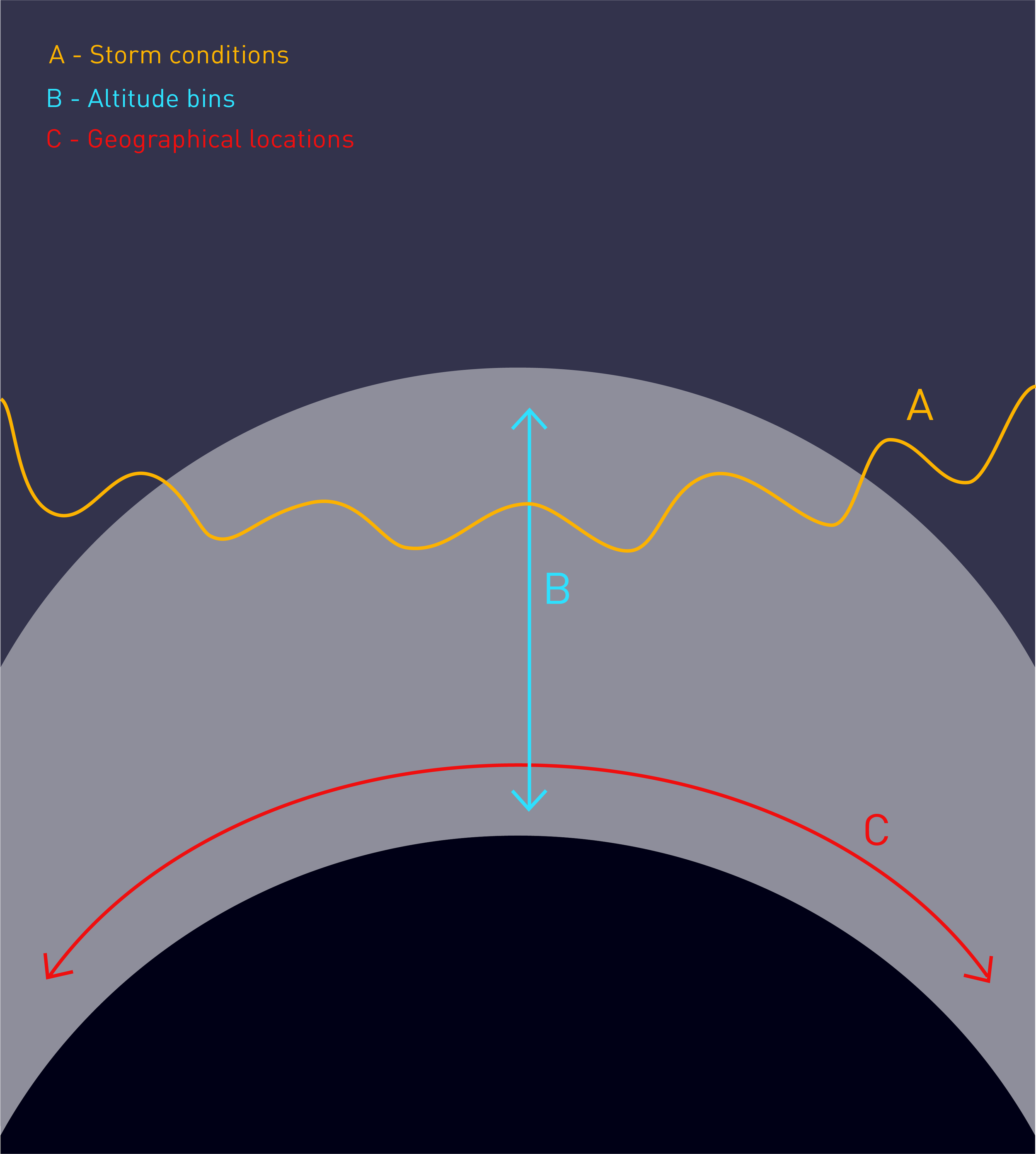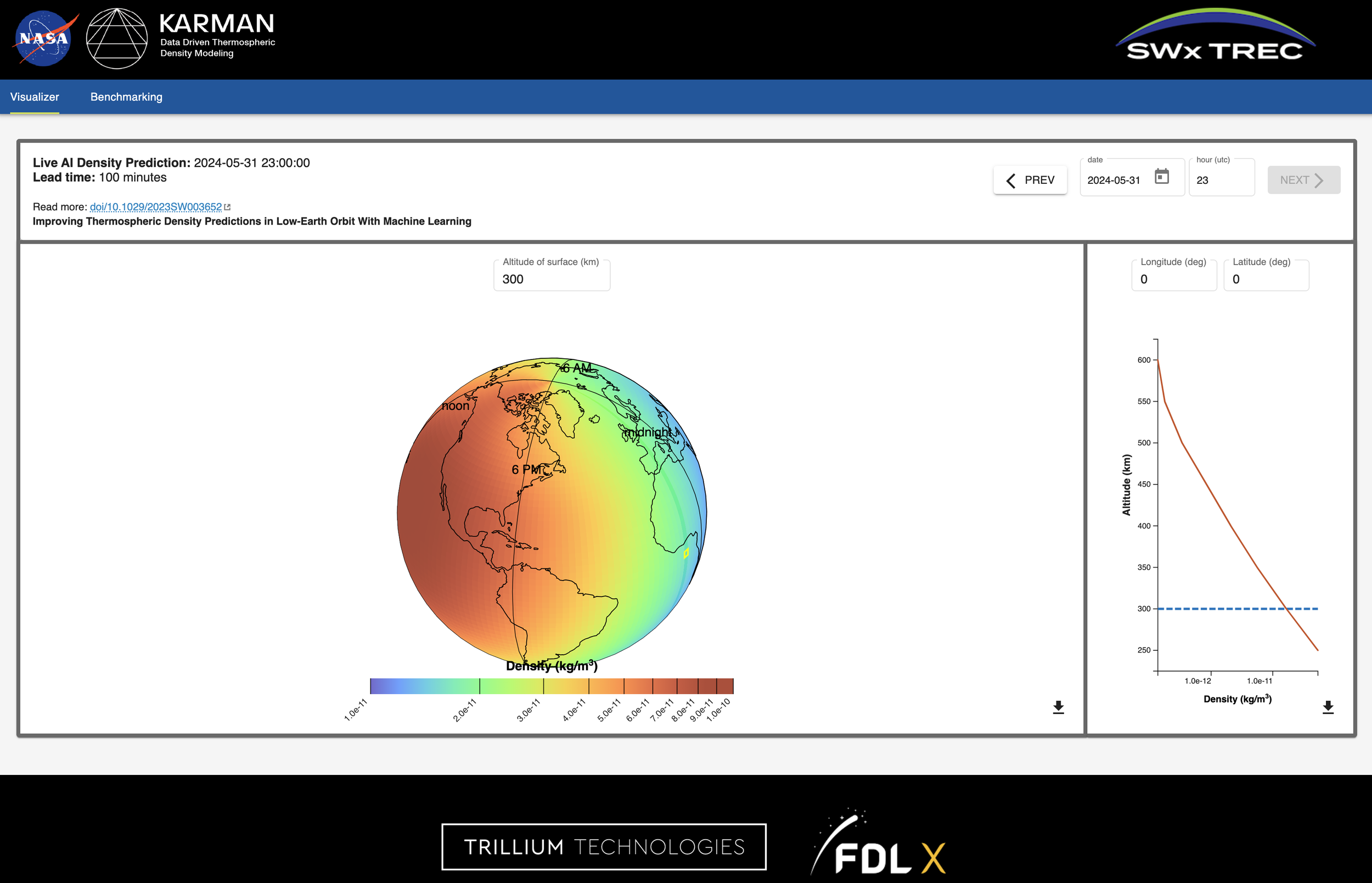
Space sustainability
AI is able to make space safer and manage the sustainable growth of spacecraft operations and satellites in orbit.
Our philosophy has been to take a phenomenological approach to space traffic management (STM) and space situational awareness (SSA), deriving insights from solar-terrestrial data and constraining these predictions with a continual learning loop based on observational behavior.We have developed two AI products. Karman replaces the current f10.7 proxy with a data-driven model for Thermospheric density. Kessler models the current LEO (Low Earth Orbit) population of spacecraft and evolution of conjunction events, emulating the CDM (Conjunction Data Messages) generation process of the Combined Space Operations Center (CSpOC).
This work represents SOTA in the use of AI for science-based prediction.
Karman
Karman is another Python package that was developed in collaboration with the Heliophysics Division of NASA. Its main goal is to improve our understanding and modelling of thermospheric density variations due to the Sun’s influence [5]. It supports a large variety of heliophysics and geomagnetic data: from EUV measurements, to solar irradiance proxies, geomagnetic measurements and indexes, and precise orbit determination-derived thermospheric density data. It can be used both for hosting state-of-the-art empirical and ML thermospheric density models, as well as for benchmarking ther performances at various geographical locations, times, geomagnetic strom, and solar irradiance conditions. This makes Karman a first-of-its-kind software framework that can be used by both the research and operational communities to develop, benchmark and validate their models, before they are deployed.
Karman is running live on SWxTREK here (100 mins in advance)
Read and download Intelligence Age #002: The Tragedy of the Cosmos: Sustainability in Orbit and Beyond below:
Kessler: predicting collision events
Kessler is a Python package providing probabilistic ML to predict future collision events and perform Bayesian inference to optimize observations.As we move into the era of megaconstellations (SpaceX Starlink, OneWeb, Amazon Kuiper, Guo Wang, and SatRevolution) conjunction events, defined as close approaches within 5 km, will increase by four orders of magnitude. For example, Starlink and OneWeb were estimated to cause a 3.3× and 250× increase in conjunctions, respectively.
Kessler synthetically generates thousands of such events, highlighting the importance of reducing observation errors to improve collision assessments (with tools such as KARMAN) and reduce the operational burden by minimizing CDM generation.
Kessler is a versatile tool for simulating and analyzing various LEO scenarios, aiding mission operations and future constellation design.
Improved thermospheric density accuracy is critical to minimizing errors in collision predictions and managing CDMs efficiently.
By reducing the conjunction threshold to 1.2 km, the number of CDMs would be reduced by a factor of 10,000
Kessler was developed by the FDL Europe Constellations Team, in partnership with the European Space Operations Centre (ESOC) of the European Space Agency and the University of Oxford. The authors have worked on several case studies published on international conferences which showcase the use of the software for assisting operators and researchers in a sustainable and safe use of space [1,2,3,4]. It is named in honor of NASA scientist Donald J. Kessler, known for his studies regarding space debris and proposing the Kessler syndrome.
Karman select publications
[1] Giacomo Acciarini, Edward Brown, Tom Berger, Madhulika Guhathakurta, James Parr, Christopher Bridges, Atılım Güneş Baydin Improving Thermospheric Density Predictions in Low-Earth Orbit With Machine Learning. https://agupubs.onlinelibrary.wiley.com/doi/10.1029/2023SW003652
[2] Giacomo Acciarini, Francesco Pinto, Francesca Letizia, José A. Martinez-Heras, Klaus Merz, Christopher Bridges, and Atılım Güneş Baydin. 2021. “Kessler: a Machine Learning Library for Spacecraft Collision Avoidance.” In 8th European Conference on Space Debris. https://conference.sdo.esoc.esa.int/proceedings/list.
[3] Giacomo Acciarini, Francesco Pinto, Sascha Metz, Sarah Boufelja, Sylvester Kaczmarek, Klaus Merz, José A. Martinez-Heras, Francesca Letizia, Christopher Bridges, and Atılım Güneş Baydin. 2020. “Spacecraft Collision Risk Assessment with Probabilistic Programming.” In Third Workshop on Machine Learning and the Physical Sciences (NeurIPS 2020), Vancouver, Canada. arXiv:2012.10260
[4] Francesco Pinto, Giacomo Acciarini, Sascha Metz, Sarah Boufelja, Sylvester Kaczmarek, Klaus Merz, José A. Martinez-Heras, Francesca Letizia, Christopher Bridges, and Atılım Güneş Baydin. 2020. “Towards Automated Satellite Conjunction Management with Bayesian Deep Learning.” In AI for Earth Sciences Workshop at NeurIPS 2020, Vancouver, Canada. arXiv:2012.12450
[5] Giacomo Acciarini, Nicola Baresi, Christopher Bridges, Leonard Felicetti, Stephen Hobbs, and Atılım Güneş Baydin. 2023. “Observation Strategies and Megaconstellations Impact on Current LEO Population”. In 2nd NEO and Debris Detection Conference at European Space Operations Centre, Darmstadt, Germany. https://conference.sdo.esoc.esa.int/proceedings/list?search=&conference=3.
[6] Acciarini, Giacomo, Edward Brown, Tom Berger, Madhulika Guhathakurta, James Parr, Christopher Bridges, and Atılım Güneş Baydin. "Improving Thermospheric Density Predictions in Low‐Earth Orbit With Machine Learning." Space Weather 22, no. 2 (2024): e2023SW003652.
[7] Acciarini, Giacomo, Edward Brown, Chris Bridges, Atılım Günes Baydin, Thomas E. Berger, and Madhulika Guhathakurta. "Karman-a machine learning software package for benchmarking thermospheric density models." In Advanced Maui Optical and Space Surveillance Technologies Conference (AMOS). 2023.
[8] Malik, Shreshth A., James Walsh, Giacomo Acciarini, Thomas E. Berger, and Atılım Güneş Baydin. "High-Cadence Thermospheric Density Estimation enabled by Machine Learning on Solar Imagery." In Bayesian Deep Learning Workshop, NeurIPS. 2023.
[9] Bonasera, Stefano, Giacomo Acciarini, J. Pérez-Hernández, Bernard Benson, Edward Brown, Eric Sutton, Moriba K. Jah, Christopher Bridges, and Atılım Günes Baydin. "Dropout and ensemble networks for thermospheric density uncertainty estimation." In Bayesian Deep Learning Workshop, NeurIPS. 2021.



